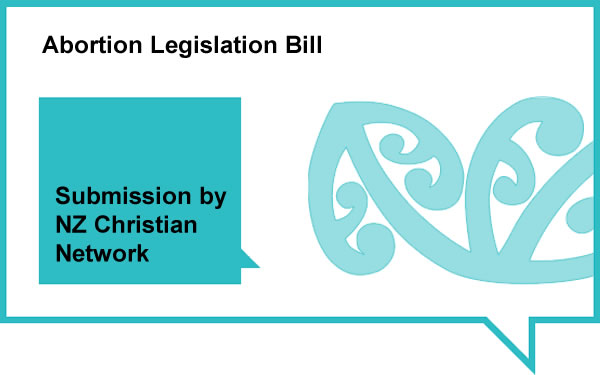NZ Christian Network is advising everyone who is concerned about the proposed Abortion Legislation Bill to make sure that they send a submission to the Abortion Legislation Committee. This matter is now very time-sensitive: Submissions close at midnight Thursday 19 September 2019.
Dr Stuart Lange wrote the following submission to the Abortion Legislation Committee in opposition to the “Abortion Legislation Bill” on behalf of New Zealand Christian Network.
The New Zealand Christian Network was established in 2002 to help churches in New Zealand to work together and to represent a reasoned Christian voice on public issues. We are a widely inter-denominational movement. We reflect a moderate orthodox/biblical Christian faith and seek to express the perspectives of at least half a million of New Zealand’s Christian people and their churches.
NZCN is OPPOSED to the “Abortion Legislation Bill”
1. We first acknowledge this is a painful issue
For many people, abortion is a very painful and divisive issue. Convictions and feelings run deep. Many find abortion tragic. Others, finding themselves unexpectedly pregnant, have been thrown into a life crisis. In anguish and fear, they have agonised over whether or not to seek an abortion, and have had to live with that decision ever since. Some grieve for family members who were never born. Many people alive today are aware that they could have been aborted, but are pleased they were not. We acknowledge that all those who proceed with unwelcome pregnancies need strong support from others, and those who have undergone an abortion need compassionate understanding.
2. Society needs good and balanced legislation
The health of pregnant women and the protection of the unborn are both matters where society needs excellent and balanced legislation. We are far from convinced that the Abortion Legislation Bill now before Parliament is adequate in either respect. If retained, this Bill would need very serious amendment.
3. The core problem with the Abortion Legislation Bill
- The core problem with the Abortion Legislation Bill is that it has no regard for the rights or protection of unborn children, and treats abortion as solely a women’s health issue. This is a radical and unwarranted change, and one we profoundly oppose. The bill allows no rights whatsoever to unborn children, and effectively removes all protection for them. The human life growing within a pregnant woman is ignored, and treated as of no significance.
- If passed, the Bill will cement into New Zealand law the principle that unborn children have no legal or human rights. This will likely pave the way in the future for an unrestricted right to abortion in New Zealand, at any stage of gestational development, and for any reason.
- The Bill abandons the approach of the existing legislation, which seeks to balance the rights and needs of a pregnant woman with the rights of an unborn child. Current legislation does not give unborn children the full status and human rights of a human being, but recognises the duty of the State to give a measure of protection to unborn human lives. It provides for lawful abortions only in circumstances such as a serious risk to the life, and/or the physical or mental health of the pregnant woman. This Bill would sweep all that away.
4. The humane State and its respect for the sanctity of life
A respect for the sanctity of human life has long been a key principle governing the laws in enlightened and democratic modern states. The State’s general respect for the intrinsic value of every human life, and including the status and rights of unborn children, has in large measure reflected biblical understandings that all people are made in the image of God, are to be treasured, that we must love others as much as we love ourselves, and that compassion and the protection of the vulnerable are non-negotiable values. In the Bible, unborn humans are seen as being exquisitely formed by God within their mother’s womb (Psalm 139:15-16). Pagan pre-Christian societies had little regard for the value of human life, and widely practised abortion, infanticide, and many other forms of cruelty, but the Christianising of society generally led to a more humane outlook. Christians rejected abortion and infanticide, and society eventually followed.
5. Respect for the sanctity of life matters to us all
Respect for the sanctity of human life is not just some religious scruple or philosophical ideal which may lightly be discarded. It is a powerful public good, and a key element of a compassionate, and safe society. It makes everyone safer. The incremental erosion of respect for the sanctity of human life makes everyone less safe. The abandoning of any protection for unborn human lives is a dangerous step for society. In the twentieth century, various oppressive States deemed successive groups as less than human, stripped them of rights, and many millions subsequently died.
6. Respect for the sanctity of life needs to be widely debated
- This Bill is not a “reform” or “updating”, as claimed, but represents a major shift in public policy with massive ethical implications. The bill is drawn up in such a way as to exclude the obvious ethical issue that abortion involves the taking of unborn life, and that society has a legitimate interest in the protection of unborn human lives.
- The arbitrary legal extinguishing of all human rights for unborn children (contrary to previous law) is a matter of major ethical and societal importance. It should be studied and debated fully. The 1977 provision in New Zealand law for abortions in some circumstances followed two years of deliberations by a Royal Commission of Enquiry, with extensive study, discussion and public consultation. No comparable process has preceded the Abortion Legislation Bill.
7. The claimed justification for the bill is spurious
- Supporters of the Bill allege that women need to have abortion “decriminalised”. But there is no basis for that. There has been provision for lawful abortion in New Zealand since 1977. Under the current legislation, no woman has ever been criminalised by having an abortion, lawful or otherwise.
- The current inclusion of parts of the existing legislation under the Crimes Act reflects the inescapable reality that abortion involves ending the life of an unborn child, which remains a very serious thing.
- We have no objection to abortion legislation being domiciled outside the framework of the Crimes Act. That is not the key issue. What really matters is that society and the state should give appropriate protection to the unborn child, along with allowing abortion where it is genuinely necessary for the health of the mother.
- The call for decriminalisation appears to be primarily a means to securing abortion on demand, with absolutely no regard for any rights of the unborn child.
8. The argument that a pregnant woman’s autonomy over “her own body”
- It is asserted that a woman should have autonomy over her “own” body, and that therefore abortion should be an absolute right. But such an argument overlooks the inescapable reality that pregnancy is about “having a baby”, and that abortion is about ending the life of that unborn baby.
- It is argued an unborn child is part of a woman’s body. That is an unsustainable claim, and clearly contrary to biological science. Certainly an unborn child is intimately connected to the mother, and utterly dependent on her body, and nourished by her body. But the baby is never part of her body.
- From the outset, a human embryo is a distinct human organism, with its own genetic code, and its own body and developing brain and organs. It is not yet a developed foetus, or a viable “human being”. But it is programmed to be born, and to live a human life beyond the womb, potentially for another hundred years. It is clearly not part of the woman’s body.
9. The claim that abortion is “just a health procedure”
Abortion may well be seen as a health procedure for a woman who does not wish to continue her pregnancy. But it is the very opposite of a “health procedure” for the unborn child.
10. The Royal Commission of Inquiry had it about right
We endorse the part of the 1977 report of the Royal Commission on Contraception, Sterilisation, and Abortion which declared it ethically wrong, except for good reason, to terminate unborn life. It asserted that, regardless of whether an unborn child can be seen as full human being, abortion “extinguishes the potentiality of life” and is thus “a most serious step”. Abortion on demand “would be to deny to the unborn child any status whatsoever”, and that it would be immoral to allow abortion “for reasons of convenience”. Protection of the unborn, it said, should only give way in the face of serious danger to the mother’s life or health.
11. The existing abortion legislation strikes a reasonable balance
The existing abortion legislation reflects the continuing desire of many in society (then and now) to extend some protection to unborn children, along with the needs of women who desire an abortion. The present law states that abortion is only lawful where there is a “serious danger to the woman’s life, physical or mental health”. We believe that is a reasonable balance (but are not happy with how the existing law has been so liberally interpreted).
12. We oppose abortion on demand, as proposed in the bill
- What is proposed in the Bill is abortion on demand, especially in the first twenty weeks of gestation. But a great many people in New Zealand society do not agree with abortion on demand, and continue to believe abortion is ethically justifiable only in certain circumstances.
- We understand the moral distinction often made between embryos in the first twenty weeks and those unborn who have reached the stage where they could be viable if born. But an embryo of any age is still a human life in the making, and in our view still deserves protection. It ultimately makes no difference to the outcome of abortion whether an unborn child is aborted early or late in pregnancy. The end result is still death. Those destroyed in the womb will never live the life they are programmed to live: they will never know love, feel the breeze on their face, see a sunset, express their individuality, work, form relationships, have children, or experience sorrow and joy. Do we truly have the right to deny them their life?
13. No legal protection for unborn babies after twenty weeks’ gestation
- What the Bill proposes for pregnancies of over twenty weeks of gestation leaves late-term unborn children with no legal protection, and vulnerable to abortion on demand.
- The proposed statutory test is a very weak and vague criterion that a “health practitioner” (not even necessarily a doctor) must “reasonably believe” the abortion is “appropriate” with regard to the woman’s physical and mental health. There is no provision in the Bill for the health professional to have any regard for the rights of the unborn child. Indeed, any regard for protecting the unborn baby may be seen as beyond the scope of the new law.
- We much prefer the way the existing law is worded, that after 20 weeks’ gestation lawful abortions are only allowed “when it is necessary to save the woman’s life, or prevent serious permanent injury to her physical or mental health”.
- The change of law regarding abortions after 20 weeks of gestation will very likely increase the number of late-term abortions.
- The proposed legislation will inevitably lead to the abortion of many more babies with disabilities, and to abortions on the grounds of sex-selection. There is nothing in the proposed legislation to prevent either of those outcomes.
- Any abortion involves the death of the unborn, but – except in circumstances where it is truly necessary – the abortion of babies who would be capable of living if born alive is especially repugnant. Morally, it is very similar to infanticide.
14. The passing of the Bill would increase overall abortion rates
- Legislation helps shape public attitudes. The availability of abortion on demand, in effect both before and after twenty weeks’ gestation, and the deliberate jettisoning of any legal protection for unborn human life, will almost certainly lead to an increase in the number of abortions in New Zealand. That is tragic, not least because the number of abortions has been declining.
- We accept that abortion is sometimes ethically justified. We agree that abortion should be “safe, legal and rare”. This Bill look set to achieve the very opposite of “rare”.
15. A major blind spot
The promotion of abortion on demand, without any regard for the life of the unborn child, is deeply inconsistent with all the commendable rhetoric in our society about the wellbeing of children, care for the vulnerable, and compassion. Unborn babies are not sub-human nothings. Biologically, they are us.
16. The language of the bill is de-humanising
We believe the change of language used by the bill is insidious in the way it de-humanises unborn children. The Crimes Act rightly refers to foetuses as an “unborn child”. But the proposed Bill only uses the term “foetus”. By and large the Bill ignores the existence of the unborn, or that any abortion “health procedure” always involves a death. The Bill also refers to the lethal drug(s) used in injections to kill foetuses as “medicine”.
17. If the Bill is retained, it should have many amendments, e.g.
- The reinstatement of protection for the life of the unborn, at least after 20 weeks, making abortion after that point unlawful except for genuinely serious risk to the life of the mother and/or her physical or mental health, with explicit mention of the need to protect unborn life, and processes to ensure that provision for abortion in exceptional circumstances is not being abused by being too liberally interpreted.
- Mandatory counselling prior to any decision about abortion to ensure informed choice and consent, with objective and non-coercive information about the current stage of development of the unborn child, what abortion involves for both mother and child, the risks, alternatives to abortion, and the availability of support.
- A requirement for a short period of reflection before a decision is finalised
- Safeguards against coercion (e.g. from partner, family, school, health practitioner etc.)
- An amendment to prevent abortions on the basis of gender
- Safeguards against abortion on the grounds of minor disability
- Changing “health practitioner” to “medical practitioner”
- Strengthening freedom of conscience provision, especially in relation to employment rights of health practitioners
- Removing provision for “safe areas”, which compromises freedoms of belief, assembly, and expression









0 Comments